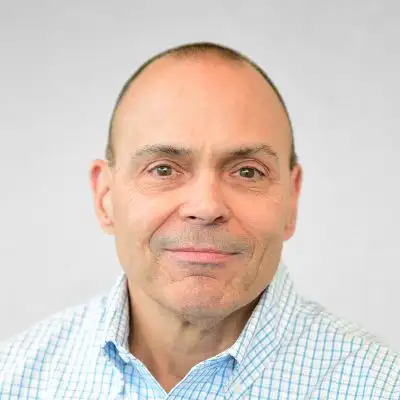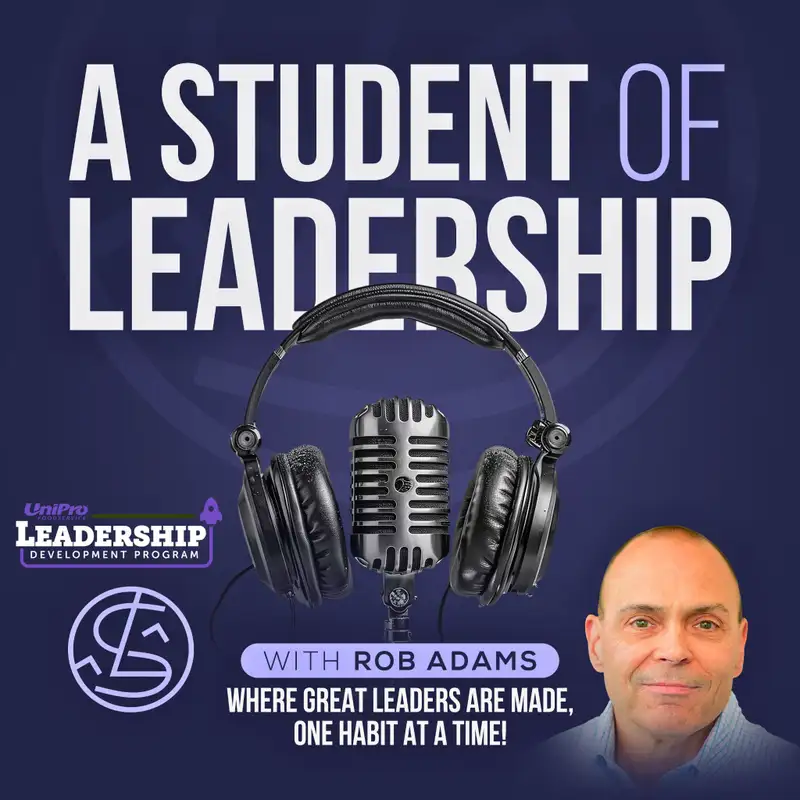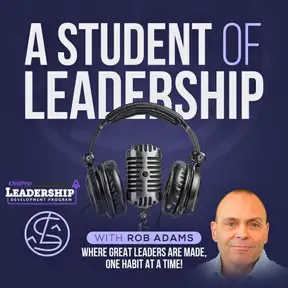Episode 17 - Leadership Trust
Download MP3Hello, and welcome to A Student of Leadership. The podcast that uncovers the secrets of exceptional leaders. Join host Rob Adams as he explores the critical habits and practices that define leadership greatness. One transformative episode at a time. From cultivating a compelling vision to embodying courage, empathy, accountability, and resilience.
Otro:You'll gain the tools and insights to elevate your leadership impact no matter where you are on your journey. Whether you're a seasoned executive or stepping into your first leadership role, each conversation will inspire and equip you to become the leader you were always meant to be. Let's dive in.
Rob Adams:Hello, everyone, and welcome back to another micro episode of A Student of Leadership. This is where great leaders are made one habit at a time. I'm Rob Adams, your host, and today we are exploring the cornerstone of everything when it comes to leadership and relationships. It's that big t word that is so crucial and so important and is foundational. Foundational.
Rob Adams:We are talking about trust, everyone. Trust isn't just another leadership skill. It's the foundation that makes all other aspects of leadership possible. Without trust, vision becomes mere words, delegation becomes micromanagement, and influence becomes coercion. When trust is present, it acts as a multiplier, accelerating decision making, fostering innovation, and creating an environment where people feel safe to take risks and contribute their very best ideas.
Rob Adams:In this episode, we'll explore the science and art of building unshakable trust. We're going to share another powerful personal story, trust based leadership in action, and provide concrete strategies to both strengthen trust within both your team and in the organization. Consider Angela Merkel's remarkable leadership during her sixteen year tenure as German Chancellor. During the two thousand fifteen refugee crisis, when many European leaders were closing borders, Merkel made the controversial decision to welcome over 1,000,000 refugees. Instead of hiding from the challenges this created, she faced them head on with remarkable transparency.
Rob Adams:Merkel held town hall meetings across Germany acknowledging citizens' concerns while explaining her moral and practical reasoning. She didn't sugarcoat the difficulties, famously stating, der Schaffen das! We can handle this! But she was also brutally honest about the challenges ahead. When integration problems arose, she didn't deflect blame but took responsibility and adjusted policies accordingly.
Rob Adams:During the COVID-nineteen pandemic, Merkel's scientific background enabled her to explain complex concepts clearly to the public. She shared not just what decisions were being made but why they were being made including the data and reasoning behind each choice. This transparency combined with her consistent demonstration of competence and integrity led to Germany having one of the highest levels of public trust in government during the entire crisis. Merkel's leadership demonstrates that trust isn't built through grand gestures but through a consistent pattern of transparency, competence, and ethical decision making especially during difficult times. Stephen Covey's observation that trust is the one thing that changes everything, it takes on deeper meaning when considering its practical implications.
Rob Adams:In high trust environments, decisions that might take weeks happen in hours, innovations that never surface are freely shared, and challenges that might break teams become opportunities for both growth and building stronger bonds. Now let's reflect. How do you demonstrate vulnerability while maintaining credibility as a leader? What specific behaviors do you build or erode trust in your leadership environment? Think about that.
Rob Adams:What are the specific behaviors that either build or erode trust in your leadership environment? And how do you balance transparency with the need for confidentiality in sensitive situations? A 2023 PwC Global Trust and Leadership study revealed that 55% of employees trust their direct manager more than their company, and teams with high trust leaders show 74% less stress, 106% more energy at work, and 50% higher productivity. Perhaps the most striking is that employees in high trust organizations report 76% more engagement and 40% less burnout. Now here are three powerful strategies to build and maintain trust.
Rob Adams:Number one, practice predictable vulnerability. Share appropriate challenges and uncertainties with your team. Being consistently open about what you know and what you don't know, and working to figure it out creates psychological safety and encourages others to do the same. Number two, create trust rituals. Establish regular practices that demonstrate and reinforce trust, such as learning from failure, sessions where mistakes are discussed openly, or assumption testing meetings where team members can safely challenge the current thinking.
Rob Adams:And number three, build trust systematically. Develop clear decision making frameworks that show when and how you'll involve others, share information, and handle sensitive situations. This transforms trust from a personal quality to an organizational practice. Remember, trust isn't just about being trustworthy. It's about actively creating conditions where trust can flourish.
Rob Adams:Your action challenge for this week is to conduct a trust audit of your leadership relationships. I want you to identify three key stakeholders and assess the trust level in each of those relationships. For each of the documents, I want you to one, create current trust building behaviors, document that. Two, any trust eroding patterns, document that. And three, any specific actions you can take to strengthen trust.
Rob Adams:Choose one relationship and implement your trust building plan this week. You see trust is more than a leadership quality. It's the invisible force that transforms groups of individuals into high performing teams. As you work on this week's action challenge, remember that every interaction builds or erodes trust. Choose your actions intentionally.
Rob Adams:Next week, we'll explore listening. Now, just as communication skill, but as a powerful tool for building understanding, fostering innovation, and creating an environment where every voice listens. It's not just that skill, but a powerful tool. Remember that. Until then, keep practicing the habits that make great leaders, and remember, great leaders are made one habit at a time.
Rob Adams:See you next time on A Student of Leadership. Take care, everyone.
Otro:Thanks for tuning in to this episode of A Student of Leadership. If you liked what you heard, then be sure to subscribe and share with like minded people. Have a burning question for Rob or a topic you'd love him to discuss on the show? Get in touch on socials. We'd love to hear from you.
Otro:We'll see you next time. And remember, great leaders are made one habit at a time.
Creators and Guests


